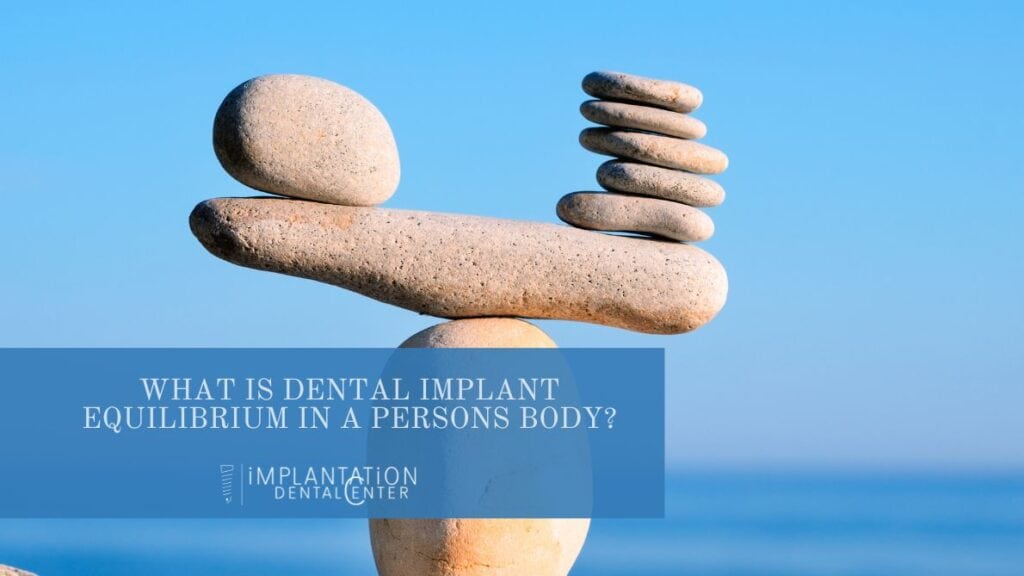What is Dental Implant Equilibrium?
A dental implant equilibrium refers to the state in which a dental implant, which is an artificial tooth root made of biocompatible materials, is fully integrated and stable within a person’s jawbone.
When a dental implant is inserted into the jawbone, a process called osseointegration takes place, during which the implant fuses with the surrounding bone tissue. This process can take several months and requires proper healing and maintenance to ensure successful integration.
Once the osseointegration process is complete, the dental implant should be in a state of equilibrium with the person’s body, meaning it is fully integrated and stable within the jawbone, and there is no inflammation or movement. This equilibrium is important for the long-term success of the implant, as any disruption to the stability or integrity of the implant can lead to complications such as infection, implant failure, and bone loss.
Proper oral hygiene, regular dental check-ups, and avoiding habits such as smoking can help maintain the equilibrium of a dental implant and ensure its long-term success.
Why can a dental implant suddenly fail after many years of osseointegration?
While dental implants are generally considered a highly successful and durable solution for tooth replacement, there can be cases where an implant may fail after many years of osseointegration. There are several reasons why this can happen, including:
- Peri-implantitis: This is a bacterial infection that affects the tissues surrounding the implant, leading to inflammation and bone loss. If left untreated, peri-implantitis can cause the implant to become unstable and eventually fail.
- Overloading: Dental implants are designed to withstand normal chewing forces, but excessive forces can cause the implant to fail. This can happen if a person grinds their teeth, has an improper bite, or if there are too few implants supporting a prosthetic restoration.
- Poor oral hygiene: Maintaining good oral hygiene is essential for the long-term success of a dental implant. If a person does not brush and floss regularly or attend regular dental check-ups, they may develop gum disease or other oral health problems that can affect the implant’s stability.
- Medical conditions: Certain medical conditions such as diabetes, osteoporosis, and autoimmune diseases can affect the body’s ability to heal and integrate with the implant, leading to failure.
- Implant design or placement: In rare cases, an implant may fail due to an issue with the design or placement of the implant. This can include issues such as inadequate bone volume or density, implant fracture, or incorrect positioning of the implant.
If an implant fails, it is important to consult with a dental professional to determine the cause of the failure and develop a treatment plan. In some cases, the implant may need to be removed and replaced, while in other cases, the issue can be resolved with non-surgical interventions such as antibiotic therapy or changes in oral hygiene habits.
What is the bacteria that usually creates peri-implantitis?
Peri-implantitis is a type of bacterial infection that affects the soft and hard tissues surrounding dental implants. The bacteria that typically cause peri-implantitis are similar to those that cause periodontitis, a bacterial infection that affects the gums and bone that support natural teeth.
Some of the bacteria commonly associated with peri-implantitis include:
- Porphyromonas gingivalis
- Aggregatibacter actinomycetemcomitans
- Prevotella intermedia
- Tannerella forsythia
These bacteria are commonly found in the oral cavity and can colonize on the surface of dental implants if oral hygiene is not maintained properly. Once these bacteria establish themselves on the implant surface, they can create a biofilm, which is a complex community of microorganisms that can be difficult to eliminate.
If left untreated, peri-implantitis can lead to progressive bone loss around the implant, eventually resulting in implant failure. Therefore, it is important to maintain good oral hygiene practices, including brushing twice a day, flossing daily, and attending regular dental check-ups, to reduce the risk of peri-implantitis and other oral health problems.
Whether you are considering dental implants because of missing teeth, poorly fitting dentures, or other reasons, it is a vital decision that should be made after careful consideration and consultation with an experienced dentist. If you are in Plantation, Florida, and interested in learning more about dental implants, we welcome you to visit Implantation Dental Center, where our expert team will be happy to guide you through the process and answer any concerns you might have. Don’t let missing teeth hold you back from living your best life. Contact us today and schedule your dental implant consultation.



